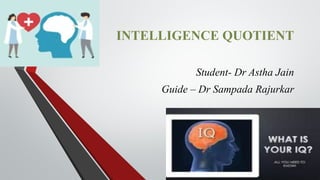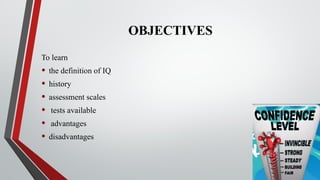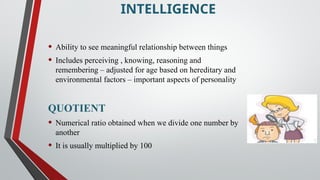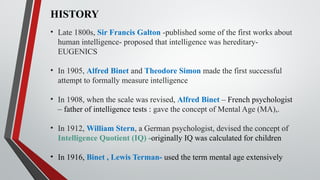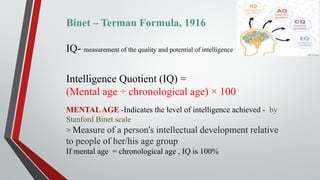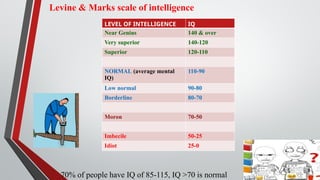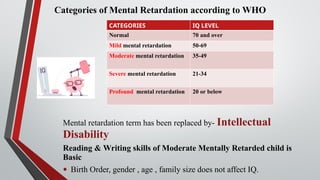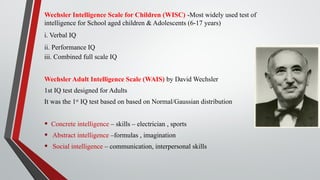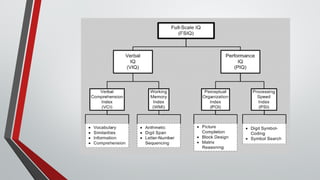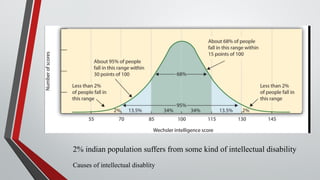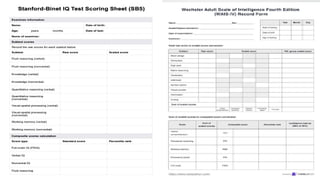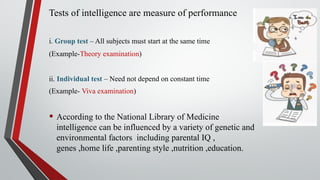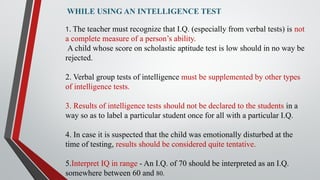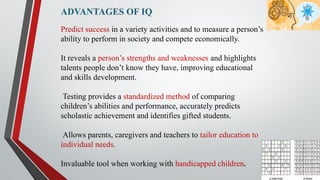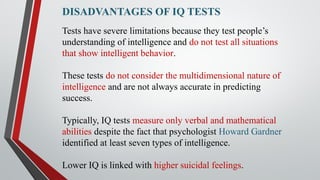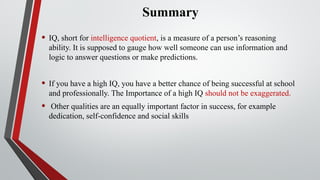IQ- intelligence quotient - community medicine PSM.pptx
- 1. INTELLIGENCE QUOTIENT Student- Dr Astha Jain Guide – Dr Sampada Rajurkar
- 2. OBJECTIVES To learn • the definition of IQ • history • assessment scales • tests available • advantages • disadvantages
- 3. INTELLIGENCE • Ability to see meaningful relationship between things • Includes perceiving , knowing, reasoning and remembering – adjusted for age based on hereditary and environmental factors – important aspects of personality QUOTIENT • Numerical ratio obtained when we divide one number by another • It is usually multiplied by 100
- 4. HISTORY • Late 1800s, Sir Francis Galton -published some of the first works about human intelligence- proposed that intelligence was hereditary- EUGENICS • In 1905, Alfred Binet and Theodore Simon made the first successful attempt to formally measure intelligence • In 1908, when the scale was revised, Alfred Binet – French psychologist – father of intelligence tests : gave the concept of Mental Age (MA),. • In 1912, William Stern, a German psychologist, devised the concept of Intelligence Quotient (IQ) -originally IQ was calculated for children • In 1916, Binet , Lewis Terman- used the term mental age extensively
- 5. Binet – Terman Formula, 1916 IQ- measurement of the quality and potential of intelligence Intelligence Quotient (IQ) = (Mental age ÷ chronological age) × 100 MENTALAGE -Indicates the level of intelligence achieved - by Stanford Binet scale > Measure of a person's intellectual development relative to people of her/his age group If mental age = chronological age , IQ is 100%
- 6. 70% of people have IQ of 85-115, IQ >70 is normal Levine & Marks scale of intelligence LEVEL OF INTELLIGENCE IQ Near Genius 140 & over Very superior 140-120 Superior 120-110 NORMAL (average mental IQ) 110-90 Low normal 90-80 Borderline 80-70 Moron 70-50 Imbecile 50-25 Idiot 25-0
- 7. Mental retardation term has been replaced by- Intellectual Disability Reading & Writing skills of Moderate Mentally Retarded child is Basic • Birth Order, gender , age , family size does not affect IQ. Categories of Mental Retardation according to WHO CATEGORIES IQ LEVEL Normal 70 and over Mild mental retardation 50-69 Moderate mental retardation 35-49 Severe mental retardation 21-34 Profound mental retardation 20 or below
- 8. Wechsler Intelligence Scale for Children (WISC) -Most widely used test of intelligence for School aged children & Adolescents (6-17 years) i. Verbal IQ ii. Performance IQ iii. Combined full scale IQ Wechsler Adult Intelligence Scale (WAIS) by David Wechsler 1st IQ test designed for Adults It was the 1st IQ test based on based on Normal/Gaussian distribution • Concrete intelligence – skills – electrician , sports • Abstract intelligence –formulas , imagination • Social intelligence – communication, interpersonal skills
- 10. 2% indian population suffers from some kind of intellectual disability Causes of intellectual disablity
- 12. Tests of intelligence are measure of performance i. Group test – All subjects must start at the same time (Example-Theory examination) ii. Individual test – Need not depend on constant time (Example- Viva examination) • According to the National Library of Medicine intelligence can be influenced by a variety of genetic and environmental factors including parental IQ , genes ,home life ,parenting style ,nutrition ,education.
- 13. WHILE USING AN INTELLIGENCE TEST 1. The teacher must recognize that I.Q. (especially from verbal tests) is not a complete measure of a person’s ability. A child whose score on scholastic aptitude test is low should in no way be rejected. 2. Verbal group tests of intelligence must be supplemented by other types of intelligence tests. 3. Results of intelligence tests should not be declared to the students in a way so as to label a particular student once for all with a particular I.Q. 4. In case it is suspected that the child was emotionally disturbed at the time of testing, results should be considered quite tentative. 5.Interpret IQ in range - An I.Q. of 70 should be interpreted as an I.Q. somewhere between 60 and 80.
- 14. ADVANTAGES OF IQ Predict success in a variety activities and to measure a person’s ability to perform in society and compete economically. It reveals a person’s strengths and weaknesses and highlights talents people don’t know they have, improving educational and skills development. Testing provides a standardized method of comparing children’s abilities and performance, accurately predicts scholastic achievement and identifies gifted students. Allows parents, caregivers and teachers to tailor education to individual needs. Invaluable tool when working with handicapped children.
- 15. DISADVANTAGES OF IQ TESTS Tests have severe limitations because they test people’s understanding of intelligence and do not test all situations that show intelligent behavior. These tests do not consider the multidimensional nature of intelligence and are not always accurate in predicting success. Typically, IQ tests measure only verbal and mathematical abilities despite the fact that psychologist Howard Gardner identified at least seven types of intelligence. Lower IQ is linked with higher suicidal feelings.
- 16. Summary • IQ, short for intelligence quotient, is a measure of a person’s reasoning ability. It is supposed to gauge how well someone can use information and logic to answer questions or make predictions. • If you have a high IQ, you have a better chance of being successful at school and professionally. The Importance of a high IQ should not be exaggerated. • Other qualities are an equally important factor in success, for example dedication, self-confidence and social skills
- 17. THANK YOU! References Dr John Everett Park. Park’s Text book of preventive and social medicine. 27ed. Pune-Banarsidas Bhanot publishers 2023.
